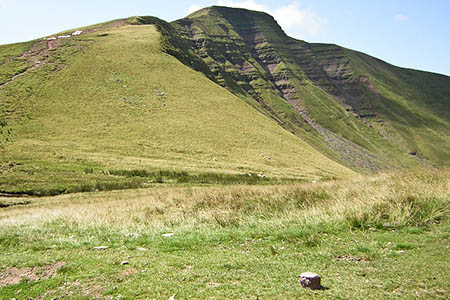Two servicemen have died and another is in a serious condition in hospital after collapsing near south Wales’s highest mountain.
The Territorial Army members were taking part in an exercise close to Pen y Fan in the Brecon Beacons yesterday on the hottest day so far this year.
A Ministry of Defence spokesperson said: “The MoD can confirm that it is working with Dyfed Powys Police to investigate an incident during a training exercise on the Brecon Beacons on Saturday in which two members of military personnel died.
“The two servicemen’s next of kin have been informed.”
Police said they are investigating the circumstances surrounding the deaths.
Four volunteer mountain rescue teams were involved in the operation to help the soldiers.
Thirty members of Central Beacons, Brecon and Abergavenny-based Longtown Mountain Rescue Teams and Western Beacons Mountain Search and Rescue Team joined the operation near 886m (2,907ft) Pen y Fan.
Mark Moran, from Central Beacons MRT, said: “We would like to pay tribute to all our members who took part in yesterday’s rescue operation. They are all volunteers, who are highly trained and dedicated.
“We were working alongside military personnel who remained extremely calm and professional during this tragic incident.
“Our thoughts are now with the families of those involved.”
Dyfed-Powys Police said the coroner had been informed.
The Brecon Beacons are used by the Special Air Service and other branches of the military for training.
The temperature at the nearby Sennybridge base reached 28C yesterday.
In January this year, Captain Rob Carnegie of the Royal Corps of Signals died on the neighbourng Corn Du mountain in wintry conditions.

thisnthat
18 July 2013Typical military 'ego before sense' causing more deaths. Help for Heroes my arrse.
Harry
02 August 2013As a former SAS member who has served on operational service I know the worth of the arduous selection process and course. No one wants soldiers undergoing selection to be injured or killed, but despite best efforts this can sometimes happen. We all learn valuable lessons from these unfortunate and sad events. But such rigourous training standards are absolutely necessary if soldiers are to attain the level and standard of fitness and competency required of an SAS soldier. There can be no short-cuts or watering down of performance standards or the conditions under which such standards are achieved. SAS soldiers, like all other Arms of the military train for war, and war is very unforgiving place if a soldier is not adequately and properly trained for combat. It is often forgotten that the loss of a SAS soldier undergoing selection or in training can be due to a weakness in the individual or system or a combination of both, which may need to be strengthened. The last place I want an individual or system weakness showing up is on operations as this may, and often does, jeopardise the lives of other patrol members. Given a choice, and as regrettable as this choice may seem to the uninformed and armchair critics, I would much rather lose a soldier in training at home than lose him or her in combat and run the risk of losing a whole patrol and mission failure.